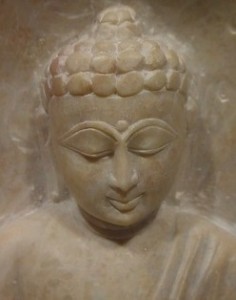
One who does good rejoices in the two worlds, in this world and in the other. He rejoices more and more as he recalls his good deeds.
One who does evil suffers in the two worlds, in this world and in the other. “I have done wrong”: this thought torments him. And his torments increase still more as he follows the way which leads to the infernal world.
One who does good rejoices in the two worlds, in this world and in the other. “I have done good”: the thought rejoices him and his happiness increases more and more as he follows the way that leads to the celestial world. (Taken from the Dhammapada)
It would almost seem from these texts that Buddhism accepts the idea of a hell and a heaven; but that is quite a superficial way of understanding; for, in a deeper sense, this was not the thought of the Buddha. The idea on which he always insisted is that you create, by your conduct and the state of your consciousness, the world in which you live. Everyone carries in himself the world in which he lives and in which he will continue to live even when he loses his body, because, according to the Buddha’s teaching, there is, so to say, no difference between life in the body and life outside the body.
Some persons believe, some traditions teach that to leave the body is a blessing and that all difficulties disappear, provided, however, you fulfil certain rites, as in some religions, and that is also why so much importance is given to the religious rites which are, as it were, a passport for going to a happier region once you have left the body. Some even imagine that as soon as you leave the body you at once leave your miseries behind; but it is far from being true and this is what the Dhammapada points out here: what it calls the infernal world consists of psychological ranges, particular states of consciousness you enter when you do wrong, that is to say, when you stray away from all that is beautiful, pure, happy and you live in ugliness and wickedness. Nothing is more disheartening than to live in an atmosphere of wickedness.
What the Dhammapada says here in an almost puerile way is essentially true. Naturally, it does not refer to those who think, “Oh, how good I am, how nice I am!” and therefore feel happy. That is childishness. But when you are good, when you are generous, noble, disinterested, kind, you create in you, around you, a particular atmosphere and this atmosphere is a sort of luminous release. You breathe, you blossom like a flower in the sun; there is no painful recoil on yourself, no bitterness, no revolt, no miseries. Spontaneously, naturally, the atmosphere becomes luminous and the air you breathe is full of happiness. And this is the air that you breathe, in your body and out of your body, in the waking state and in the state of sleep, in life and in the passage beyond life, outside earthly life until your new life.
Every wrong action produces on the consciousness the effect of a wind that withers, of a cold that freezes or of burning flames that consume.
Every good and kind deed brings light, restfulness, joy-the sunshine in which flowers bloom.
The Mother





